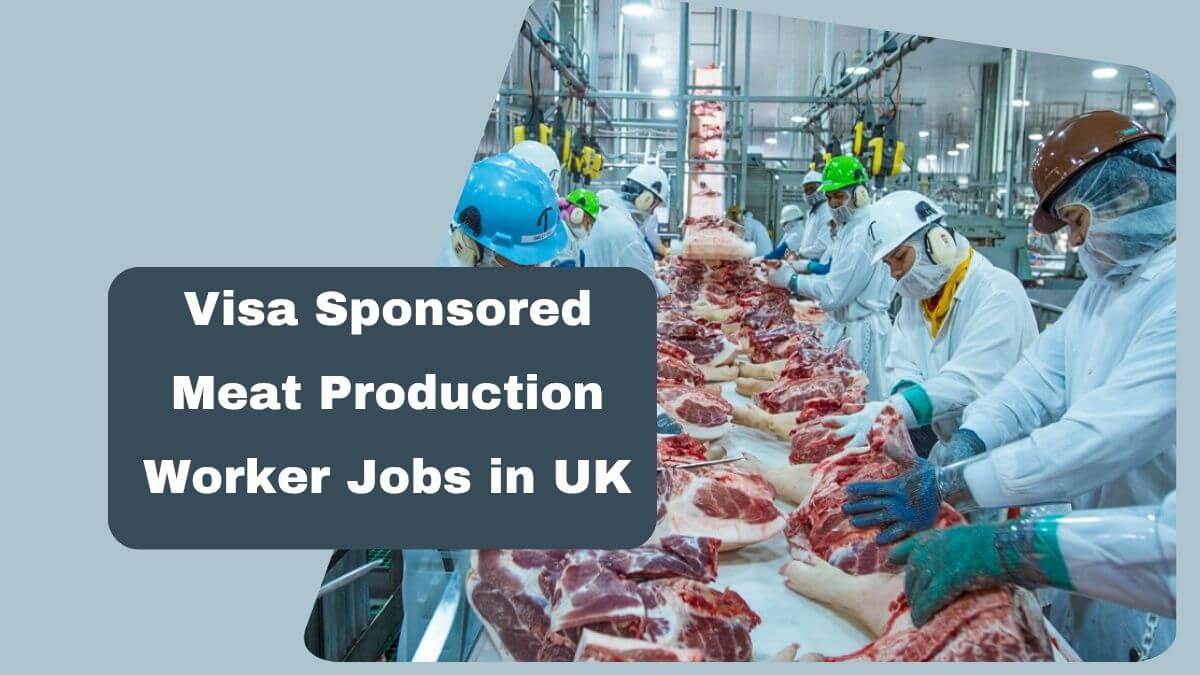Unskilled Jobs in Canada with Visa Sponsorship 2025
Obtaining Low-Skilled Jobs in Canada with Visa Sponsorship and immigrating as a low-skilled worker has become considerably easier than in the past. Large industries in all countries rely on unskilled personnel, including agricultural workers, truck drivers, servers, and janitors. Canada is no different! All nationalities, including Pakistan, India, Sri Lanka, Bangladesh, Nepal, Congo, Ghana, Cameroon, Mexico, Chile, the UAE, Saudi Arabia, and the Gulf, can apply for unskilled jobs in Canada.
Key Points:
- Country Name: Canada
- Job type: Unskilled Worker
- Experience Required: Mostly No.
- Knowledge Required: Mostly No.
- Age Limit: Minimum 20 Years
- Visa Sponsorship: Yes
- Salary: 10 CAD per hour.
- Visa required: Programs discussed below.
Which Jobs are classified as ”Unskilled” in Canada?
Exchange, sales, and service, as well as the primary and manufacturing industries, as well as specific associate professions. Certain “semi-skilled job roles” such as Front Desk Staff/ Sales Associate, for example, are included on Canada’s list of unskilled professions. The National Occupational Classification (NOC) is a comprehensive list and classification of both skilled and unskilled vocations.
Types of Work Permits for Unskilled Jobs in Canada with Visa Sponsorship:
- NOC Skill Type C encompasses vocations that typically need a secondary education and specialized training.
- NOC Skill Type D includes vocations that get on-the-job training.
Requirements for Unskilled Jobs in Canada with Visa Sponsorship:
Generally, education is not required. A High School Diploma is the minimum educational requirement for unskilled/semi-skilled jobs. However, the required experience spans between 0 and 2 years. Having one year of full-time job experience or two years of part-time work experience is advantageous in all situations.
Check Also: Visa Sponsorship No Experience Jobs in Canada – Apply Online
Benefits of Unskilled Jobs in Canada with Visa Sponsorship:
- Access to Employment Opportunities: Unskilled occupations with visa sponsorship give entry into the Canadian labor market to people without formal education or specialized skills. These occupations frequently have lower educational or experience requirements, making them more accessible to a wider range of candidates.
- Work Permit Eligibility: Visa sponsorship for unskilled jobs usually entails acquiring a work permit to lawfully work in Canada. This enables people to obtain significant work experience, make money, and sustain themselves while remaining in the nation.
- Stable Employment: Many unskilled jobs in Canada, including those in agriculture, hospitality, retail, and construction, provide consistent hours and compensation. Individuals and their families may feel more secure as a result of this steadiness.
- Competitive Compensation: While unskilled employment may not necessitate specialized training or education, many Canadian firms offer competitive compensation and benefits to attract and keep employees. This remuneration may include hourly earnings, overtime pay, perks such as health insurance, and potential for bonuses or incentives.
- Opportunities for Career Progression: Even if they begin in an unskilled profession, individuals may be able to enhance their careers over time. Workers who gain experience, learn new abilities, and demonstrate dependability and commitment may be able to advance to higher-paying or more skilled positions within their industries.
- Pathway to Permanent Residency: Working in Canada on a temporary work permit under visa sponsorship can lead to permanent residency in the country. Many Canadian immigration schemes, like the Provincial Nominee Program (PNP) and the Canadian Experience Class (CEC), require applicants to have Canadian work experience, making unskilled jobs with visa sponsorship an important step towards permanent residency.
- Access to Social Benefits: In addition to salaries, many Canadian firms offer social benefits to their employees, such as health insurance, retirement savings plans, and paid time off. Access to these advantages can boost employees’ overall well-being and quality of life.
- Cultural Exchange and Integration: Working in Canada allows people to immerse themselves in Canadian culture, engage with locals, and learn about their customs and traditions. This cultural interaction can enhance personal experiences and help to improve social integration.
- Networking Opportunities: Working in unskilled positions allows you to network with colleagues, supervisors, and other industry professionals. Building contacts and connections can lead to new work opportunities, mentorship, and professional development.
- Personal Growth and Development: Even in unskilled jobs, people can learn important soft skills like communication, teamwork, problem-solving, and time management. These abilities are transferable and can help with future job prospects and personal development.
Eligibility Criteria for Unskilled Jobs in Canada with Visa Sponsorship:
- Before applying for a work permit, you must have a legitimate employment offer from a Canadian business.
- Employers must get an LMIA from Employment and Social Development Canada (ESDC), which confirms that hiring a foreign worker would have no negative impact on the Canadian labor market.
- While specific skills and job experience may not be required for unskilled professions, relevant experience can improve your chances of getting recruited.
- You must meet the general admissibility standards, which include health and security examinations; however, some medical problems and criminal backgrounds may limit your eligibility.
- Work permits are typically only valid for a set period. Certain programs may have restrictions on how many times a work permit can be renewed.
- To view the eligibility conditions for each of the four migration programs outlined below, please see the URLs listed beneath their respective titles.
Industries having a number of Unskilled Jobs in Canada with Visa Sponsorship:
- Healthcare
- Agriculture
- Agri-food processing
- Construction
- Hospitality
Salary Package for Unskilled Jobs in Canada with Visa Sponsorship:
Salary is determined by the work role you get, your degree of education and experience, and the Canadian province in which you live (minimum and average salaries differ by province). A food and beverage attendant, for example, could earn up to $31,000 per year, whereas a long-distance carrier could make up to $74,000. However, according to Internet salary databases, the typical hourly income for an unskilled laborer is between $10.75 and $22.09.
List of Unskilled Jobs in Canada with Visa Sponsorship:
- Farmhand or laborer in a Factory
- Customer service representative Driver Cook/Chef Housekeeper Cleaner
- Forklift Driver Warehouse Employee Mechanics, Cleaners, Gardeners, and Order-Pickers
- Crop harvester, Bakery production worker, Receptionist
- Cashion Meat butcher Helper Assistant
- Practical Nurse Washer
- Cleaner
- Cleaning Supervisor Retail Sales Associate Manager
- Food Service Supervisor, Production Manager
- Warehouse Associate Retail Store Manager
- Production Worker Assembly Line Worker
- Dishwasher Line Cook
- Housekeeper
- General Labourer
- Customer Service Manager
- Cleaning Manager
- Retail Manager
- Kitchen Assistant
- Packaging Operator
- Retail Assistant Manager
- Building Maintenance Worker
What are the possible Canadian Unskilled Migration routes?
The following are methods of immigrating to Canada as an unskilled worker:
- The Provincial Nominee Program (PNP)
- The Rural And Northern Immigration Pilot
- Temporary Foreign Worker Program (TFWP)
- Agri-Food Immigration Pilot
The bulk of these positions need seasonal or holiday labor.
The Provincial Nominee Program (PNP)
The Provincial Nominee Program (PNP) focuses on a certain sector or industry job within a single Canadian province. The criteria, conditions, and prerequisites for the PNP program vary per province. As a result, if you want to target any unskilled job role in a certain province (for example, Quebec has a completely different set of terms and conditions than the rest of Canada), you must apply through PRP. Furthermore, it is the quickest and most straightforward way to obtain Canadian PR.
The Rural And Northern Immigration Pilot
The Rural And Northern Immigration Pilot Program – This program includes five areas out of eleven cities and villages. The sole need is to have a genuine job offer. According to the program’s name, all skilled and unskilled jobs under this initiative are in the agriculture/farming industry.
Temporary Foreign Worker Program (TFWP)
The Temporary Foreign Worker Program (TFWP) permits Canadian firms to hire foreign workers in a variety of skilled and unskilled jobs. To hire you, a Canadian company must produce confirmation of a Labor Market Impact Assessment (LMIA).
Occupations and NOC Codes in High Demand Under the Temporary Foreign Worker Programme (TFWP).
Agri-Food Immigration Pilot
The Agri-Food Immigration Pilot aims to hire skilled immigrant workers, mostly from Latin American and NAFTA countries. This program targets the needs of Canada’s agri-food sector. This program is ideal for full-time employees and experienced Agri-Food Industry experts. It provides Canadian permanent residency.
Occupations/NOC Codes in High Demand for the Agri-Food Immigration Pilot.
Conclusion:
All of these migration initiatives provide a gateway to unskilled jobs in Canada with visa sponsorship. However, applying through the PNP and Agri-Food Immigration programs ensures permanent residency.
Frequently Asked Questions:
How can I go to Canada as an unskilled worker?
To work there, you must have a job offer and a Canadian work permit. The Temporary Foreign Worker Program (TFWP), with separate worker streams for caregivers, agricultural laborers, and other low-wage workers, serves to fill many of Canada’s vacant positions.
How can I get sponsored to work in Canada?
Canadian firms do not “sponsor” candidates to work in Canada, but they may assist with bringing in foreign workers by getting a Labour Market Impact Assessment (LMIA) or making an electronic job offer.
Can unskilled workers get LMIA in Canada?
All LMIA applications for low-skilled jobs require a contract signed by both the employer and the staff member detailing the obligations of the company to the foreign worker. These requirements involve Wages and Working Conditions.



